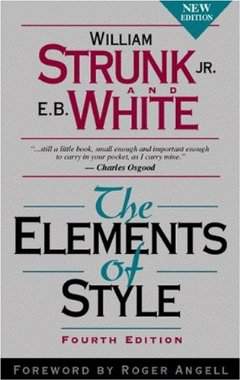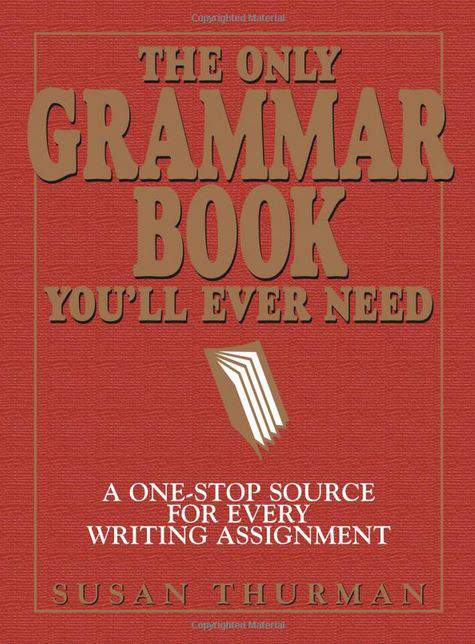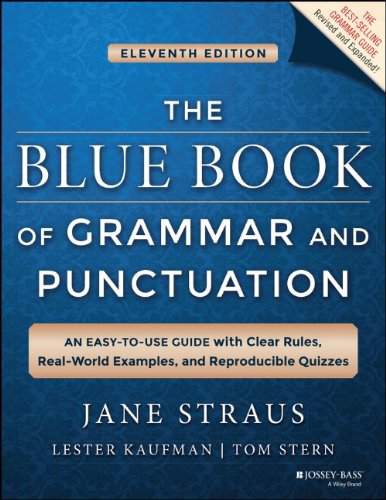

Rebekah Hendershot
Basic Verb Forms
Slide Duration:Table of Contents
Section 1: Parts of Speech
Nouns
12m 48s
- Intro0:00
- Lesson Overview0:06
- What is a Noun?0:31
- Where it Comes From0:34
- Definition0:41
- Think Johnstown0:46
- Find the Nouns Practice1:04
- Find the Nouns Answers1:29
- Singular and Plural Nouns1:58
- Singular Nouns2:05
- Plural Nouns2:09
- Singular and Plural Nouns Examples2:26
- Ends in S Sound2:36
- Collective Nouns2:54
- Definition2:56
- Treated as Singular Nouns3:07
- Collective Nouns Examples3:20
- Concrete and Abstract Nouns3:46
- Concrete Nouns3:50
- Abstract Nouns4:07
- Concrete Nouns Examples4:20
- Abstract Nouns Examples4:42
- Proper and Common Nouns5:14
- Proper Nouns5:17
- Common Nouns5:25
- Capitalization5:41
- Proper and Common Nouns Examples6:06
- Count and Non-Count Nouns6:30
- Count Nouns6:34
- Non-Count Nouns6:47
- Examples7:13
- Find the Nouns Practice7:44
- Find the Nouns Answers8:25
- Find the Nouns Practice 110:34
- Find the Nouns Answers 211:12
Pronouns
13m 32s
- Intro0:00
- Lesson Overview0:06
- What is a Pronoun?0:33
- Takes Place Of Nouns0:48
- Personal Pronouns1:13
- Singular1:24
- Plural1:33
- Find the Personal Pronouns Practice1:43
- Find the Personal Pronouns Answers1:59
- Possessive Pronouns2:33
- Function2:37
- Find the Possessive Pronouns Practice3:01
- Find the Possessive Pronouns Answers3:16
- Reflexive Pronouns3:41
- Function3:46
- Find the Reflexive Pronouns Practice4:05
- Find the Reflexive Pronouns Answers4:24
- Relative Pronouns4:50
- Function4:52
- Wait! What's a Clause?5:04
- Clause5:09
- Independent Clause5:23
- Subordinate Clause5:31
- Find the Relative Pronouns Practice5:40
- Find the Relative Pronouns Answers6:00
- Demonstrative Pronouns7:11
- Function7:17
- Find the Demonstrative Pronouns Practice7:34
- Find the Demonstrative Pronouns Answers7:45
- Indefinite Pronouns8:14
- Function8:21
- Find the Indefinite Pronouns Practice8:48
- Find the Indefinite Pronouns Answers9:13
- Interrogative Pronouns9:49
- Function9:54
- Find the Interrogative Pronouns Practice10:06
- Find the Interrogative Pronouns Answers10:24
- Telling Pronouns from Adjectives10:45
- How to Tell Apart10:59
- Examples11:26
- Find the Pronouns Practice12:05
- Find the Pronouns Answers12:31
Verbs
11m 46s
- Intro0:00
- Lesson Overview0:06
- What is a Verb?0:41
- Definition0:55
- Kinds of Verbs1:28
- Action Verbs1:32
- Linking Verbs1:39
- Helping Verbs2:08
- How Verbs Vary: Person2:47
- Person and Number2:58
- Follow the Verbs! Practice4:03
- Follow the Verbs! Practice4:28
- How Verbs Vary: Basic Verb Forms4:49
- Base Form4:57
- Present Participle Form5:40
- Past Participle Form6:08
- How Verbs Vary: Tense6:43
- Examples7:13
- Perfect Tense7:49
- Progressive Tense8:26
- Find the Verbs Practice9:19
- Find the Verbs Answers10:01
Adjectives
18m 33s
- Intro0:00
- Lesson Overview0:07
- What is an Adjective?0:47
- Definition0:52
- Placement in Sentence1:04
- Importance1:26
- Adjectives That Describe1:36
- Examples1:56
- Adjectives That Count3:18
- Examples3:28
- Adjectives That Specify4:00
- What They Point Out4:08
- Examples4:25
- Anything Can Be An Adjective5:01
- What Can Be An Adjective5:10
- Examples5:20
- Adjective or Noun? Practice6:16
- Adjective or Noun? Answers7:00
- Adjectives vs. Adverbs7:56
- What Adjectives Modify8:00
- What Adverbs Modify8:24
- Adjective or Adverb? Practice8:54
- Adjective or Adverb? Answers9:33
- Linking Verbs and Adjectives11:05
- What Are Linking Verbs11:13
- Examples11:32
- Using Adjectives Correctly12:35
- Adjectives Must Always Modify Nouns or Pronouns12:39
- Examples12:54
- Exercise: Find the Adjectives14:11
- Exercise Answers: Find the Adjectives14:47
- Exercise 2: Find the Adjectives16:30
- Exercise 2 Answers: Find the Adjectives17:09
Adverbs
9m 26s
- Intro0:00
- Lesson Overview0:06
- What is an Adverb?0:22
- Definition0:25
- Often Describes0:36
- Adverbs vs Adjectives0:51
- Distinction1:19
- Adverb or Adjective? Practice1:42
- Adverb or Adjective? Answers2:21
- Using Adverbs Correctly3:52
- Common Mistakes4:08
- Find the Adverbs Practice5:15
- Find the Adverbs Answers6:01
- Find the Adverbs Practice 27:24
- Find the Adverbs Answers 27:56
Prepositions
11m 31s
- Intro0:00
- Lesson Overview0:07
- What is a Preposition?0:21
- Definition0:26
- Prepositional Phrases0:42
- Examples of Prepositions1:03
- Anything You Can Do to a Log1:45
- Prepositional Phrases2:56
- Begin with a Preposition3:02
- Find the Prepositional Phrases Practice3:27
- Find the Prepositional Phrases Answers3:43
- Find the Prepositions Practice4:39
- Find the Prepositions Answers5:02
- Using Prepositions Correctly6:53
- Always Use in Prepositional Phrases6:57
- Find the Prepositions 2 Practice7:40
- Find the Prepositions 2 Answers8:09
- Find the Prepositions 3 Practice9:42
- Find the Prepositions 3 Answers10:15
Conjunctions
19m 51s
- Intro0:00
- Lesson Overview0:07
- What is a Conjunction?0:29
- Definition0:31
- 4 Kinds of Conjunctions0:46
- Coordinating Conjunctions0:55
- Definition1:06
- List of Coordinating Conjunctions1:39
- Practice1:52
- Answers2:22
- Correlative Conjunctions3:50
- Definition3:52
- List of Correlative Conjunction Examples4:12
- Practice4:31
- Answers4:57
- Subordinating Conjunctions5:47
- Definition5:50
- How They're Different5:55
- List of Subordinating Conjunctions Examples6:16
- Practice6:47
- Answers7:15
- Conjunctive Adverbs9:41
- Definition9:46
- List of Commonly Used Conjunctive Adverbs10:15
- Practice10:48
- Answers11:13
- Conjunctive Adverbs vs. Subordinating Conjunctions12:44
- Example12:51
- Find and Identify the Conjunctions Practice13:37
- Find and Identify the Conjunctions Answers14:08
- Using Conjunctions Correctly15:18
- Use Coordinating Conjunctions15:22
- Use Correlative Conjunctions15:29
- Use Subordinating Conjunctions15:37
- Use Conjunctive Adverbs15:46
- Use the Right Conjunction Practice15:55
- Use the Right Conjunction Answers16:26
- Find and Identify the Conjunctions Practice17:39
- Find and Identify the Conjunctions Answers18:02
- Find and Identify the Conjunctions 2 Practice18:56
- Find and Identify the Conjunctions 2 Answers19:15
Interjections
7m 42s
- Intro0:00
- Lesson Overview0:07
- What is an Interjection?0:25
- Definition0:27
- Examples0:46
- Punctuating Interjections0:52
- Followed by Exclamation Point1:02
- Beginning of Sentence1:13
- Classic Literature1:28
- Example2:01
- Common Interjections2:27
- Find the Interjections Practice2:56
- Find the Interjections Answers3:17
- Using Interjections Correctly3:51
- Punctuation to Use4:06
- Use Sparingly4:37
- Choose Your Interjections Practice4:47
- Choose Your Interjections Answers5:14
- Who Says It? Practice5:45
- Who Says It? Answers6:10
- Find the Interjections Practice6:35
- Find the Interjections Answers6:57
Section 2: Verb Forms and Tenses
Basic Verb Forms
11m 41s
- Intro0:00
- Lesson Overview0:09
- What is a Verb?0:40
- Definition0:43
- Five Major Kinds of Verb1:03
- Action Verbs1:33
- Examples1:40
- Linking Verbs1:57
- Replace with Equal Sign2:07
- Examples2:15
- Complement2:49
- Helping Verbs3:02
- Examples3:20
- Transitive Verbs3:45
- Definition3:59
- Examples4:18
- Intransitive Verbs4:54
- Examples5:02
- Basic Verb Forms5:20
- 3 Basic Forms5:38
- The Base Form6:06
- Examples6:35
- The Present Participle Form6:51
- Created by Adding -ing6:57
- If it Ends in E7:16
- If the Last Syllable of the Base For Has a Short Vowel Sound7:36
- The Past Participle Form8:06
- Created By8:09
- Complications8:26
- Write the Verb Forms8:52
- Fill in the Blanks9:15
- Using Basic Verb Forms10:05
- Find the Verbs Practice10:29
- Find the Verbs Answers10:53
Simple Tenses
12m 12s
- Intro0:00
- Lesson Overview0:07
- What is a Verb Tense?0:33
- Definition0:42
- 3 Simple Tenses0:51
- Review of Basic Verb Forms1:12
- Definition1:21
- Present Participle Form1:39
- Past Participle Form1:48
- Single Present Tense2:01
- Third-Person Singular2:16
- Examples2:29
- Simple Past Tense3:11
- Form Past Tense3:20
- Examples3:34
- Irregular Past Tense and Past Participle4:00
- Most Irregular Verb4:25
- Irregular Verbs with Same Past & Past Participle Forms5:09
- Irregular Verbs with Different Past & Past Participle Forms5:40
- Irregular Verbs with Same Base6:03
- Learning Irregular Verbs6:34
- Best Way to Learn Irregular Verbs6:44
- Simple Future Tense7:04
- You It for 2 Kinds of Actions7:13
- Using Simple Tenses8:01
- Use it For8:05
- Examples8:15
- Use Simple Past Tense8:36
- Examples8:42
- Using Simple Future Tense9:06
- Examples9:15
- Using Simple Tenses Practice9:29
- Using Simple Tenses Answers9:55
- Using Simple Tenses Practice 210:37
- Using Simple Tenses Answers 211:08
Perfect Tenses
11m 21s
- Intro0:00
- Lesson Overview0:09
- What is a Perfect Tense?0:30
- Definition0:33
- Form0:50
- Present Perfect Tense1:04
- To Form the Present Perfect Tense1:07
- When to Use1:20
- Examples1:28
- Past Perfect Tense2:06
- When to Use2:14
- Examples2:37
- Future Perfect Tense3:08
- When to Use3:18
- Examples3:33
- Irregular Perfect Tenses4:18
- Examples4:32
- Using Perfect Tenses Practice5:08
- Using Perfect Tenses Answers5:44
- Using Perfect Tenses Correctly6:59
- Present Perfect Tense7:06
- Past Perfect Tense7:20
- Future Perfect Tense7:40
- Using Perfect Tenses Practice 27:55
- Using Perfect Tenses Answers 28:28
- Using Perfect Tenses Practice 39:24
- Using Perfect Tenses Answers 310:00
Progressive Tenses
12m
- Intro0:00
- Lesson Overview0:06
- What is a Progressive Tense?0:36
- What It Describes0:40
- Formed0:55
- Present participle Form1:05
- Present Progressive Tense1:12
- Form the Present Progressive Tense1:15
- Use and Examples1:30
- Past Progressive Tense2:02
- Formed2:06
- Examples2:29
- Future Progressive Tense3:03
- Form the Future Perfect Tense3:05
- When to Use3:12
- Examples3:19
- Perfect Progressive Tenses3:45
- Verb in Perfect Progressive Tense Describes3:53
- Form4:13
- Examples4:24
- Past Perfect Progressive Tense5:05
- Formed5:08
- Use5:17
- Examples5:25
- Future Perfect Progressive Tense6:02
- Form6:04
- Use6:11
- Examples6:17
- Using Progressive Tenses Practice6:53
- Using Progressive Tenses Answers7:27
- Using Perfect Progressive Tenses Practice8:31
- Using Perfect Progressive Tenses Answers9:08
- Use the Correct Tense Practice10:12
- Use the Correct Tense Answers10:44
Conditional Tenses & Subjunctive Mood
10m 28s
- Intro0:00
- Lesson Overview0:09
- What are Conditional Tenses?0:27
- Definition0:31
- Two Parts0:43
- Conditional Tenses1:13
- If Your Statement States a Conditional Fact1:14
- Examples1:26
- If Your Statement Makes a Prediction1:46
- Examples2:02
- If Your Sentence Speculates About Something Unlikely to Happen2:21
- Examples2:39
- If Your Sentence Speculates About Something That Didn't Happen3:21
- Examples3:44
- If Your Sentence Speculates About Somethings That's Contrary to Fact4:11
- Examples4:37
- The Subjunctive Mood5:09
- Moods are Different From Tenses5:16
- When Subjunctive Mood is Used5:32
- Use to Describe Somethings Wished For5:57
- Use to Describe Somethings Requested6:06
- Use to Describe Somethings Contrary to Fact6:18
- Use the Correct Tense Practice6:33
- Use the Correct Tense Answers7:08
- Use the Correct Tense Practice 28:15
- Use the Correct Tense Answers 28:56
Section 3: Sentence Parts and Patterns
Subjects
15m 8s
- Intro0:00
- Lesson Overview0:09
- What is a Sentence?0:43
- Series of Words0:48
- Exceptions1:01
- What is a Subject?1:09
- Definition1:10
- Examples1:24
- Usually Comes Before the Verb1:48
- Exception 11:56
- Exception 22:25
- Exception 32:57
- The Simple Subject3:14
- Definition3:18
- Examples3:28
- Can Be a Single Word, Phrase or Clause4:29
- Examples4:44
- The Complete Subject5:29
- Definition5:32
- Examples5:39
- Find the Subjects Practice5:50
- Find the Subjects Answers6:09
- The Understood Subject6:54
- Imperative Sentence7:00
- Examples7:18
- The Single Subject7:55
- Definition7:59
- Examples8:08
- The Compound Subject8:46
- Definition8:47
- Examples8:54
- When It's Joined by 'and'9:34
- When It's Joined by 'or'9:46
- Finding the Subject10:27
- Usually Find Near the Beginning of the Sentence1:30
- Sometimes it Comes Before the Subject10:58
- Never Part of a Prepositional Phrase11:23
- Examples11:30
- Find the Subject Practice11:52
- Find the Subject Answers12:17
- Find the Subject Practice13:14
- Find the Subject Answers13:47
Predicates
13m 2s
- Intro0:00
- Lesson Overview0:07
- What is a Predicate?0:25
- Definition0:28
- Objects, Modifiers, and Complements0:40
- The Single Predicate1:16
- Examples1:36
- The Compound Predicate2:35
- Examples2:48
- Predicates and Sentence Patterns3:24
- Pattern 1: Subject-Verb3:41
- Pattern 2: Subject-Linking Verb-Complement3:58
- Pattern 3: Subject-Verb-Direct Object4:23
- Pattern 4: Subject-Verb-Indirect Object4:51
- Linking Verbs and Complements5:16
- Linking Verbs5:19
- Complements5:25
- Examples5:40
- To Be5:59
- Descriptive Verbs6:08
- Examples6:23
- If the Predicate Does Not Have a Subject Complement7:04
- Examples7:13
- Find the Predicates Practice8:22
- Find the Predicates Answers8:44
- Find the Predicates Practice 29:45
- Find the Predicates Answers 210:14
- Find the Predicates Practice 311:13
- Find the Predicates Answers 311:44
Objects
11m 49s
- Intro0:00
- Lesson Objectives0:07
- Transitive and Intransitive Verbs0:24
- Transitive Verb0:28
- Intransitive Verb0:57
- What is an Object?1:18
- Definition1:20
- Examples1:36
- The Direct Object2:22
- Definition2:26
- Examples2:29
- The Indirect Object2:50
- Examples2:55
- Object of a Verb vs. Object or a Preposition4:24
- Examples4:38
- Find the Objects Practice5:40
- Find the Objects Answers6:04
- Find the Objects Practice 28:05
- Find the Objects Answers 28:24
- Find the Objects Practice 39:48
- Find the Objects Answers 310:11
Sentence Types
9m 18s
- Intro0:00
- Lesson Objectives0:06
- What is a Sentence?0:24
- Definition0:27
- Basic Order for Sentences0:38
- Four Common Subject-Predicate Patterns0:50
- The Simple Sentence1:10
- Definition1:11
- Examples1:56
- The Compound Sentence2:11
- Definition2:15
- Example2:33
- The Complex Sentence2:59
- Definition3:02
- Example3:12
- The Compound-Complex Sentence3:47
- Definition3:51
- Example4:03
- What Kind of Sentence? Practice4:44
- What Kind of Sentence? Answers5:03
- What Kind of Sentence? Practice 26:08
- What Kind of Sentence? Answers 26:26
- What Kind of Sentence? Practice 37:29
- What Kind of Sentence? Answers 37:50
Section 4: Trouble with Verbs
Helping Verbs
8m 42s
- Intro0:00
- Lesson Overview0:07
- What is a Helping Verb?0:32
- Indicate the Tense of the Base Verb0:34
- Two Kinds of Helping Verbs0:56
- Helping Verbs: Tenses1:03
- To Have, To Do, and To Be1:07
- Examples1:16
- Helping Verbs: Modals2:02
- Modals Defined2:04
- Examples2:23
- How to Use Helping Verbs2:46
- Use the Base Form After Modal Helping Verbs3:02
- Use the Base Form After Forms of Do3:09
- Use the Present Participle Form After Forms of Be3:18
- Use the Past Participle After Forms of Have3:29
- Be Should be Preceded by a Modal3:40
- Been Must be Preceded by Have, Has or Had4:12
- What Modals Mean4:30
- Will/ Would/ Could4:37
- Can/ Could4:55
- May/ Might, Can/ Could5:08
- May/ Might5:22
- Should (recommendation)5:41
- Should (expectation)5:54
- Must, Have To, Ought To, Need To6:02
- Use the Correct Helping Verb Practice6:18
- Use the Correct Helping Verb Answers6:45
- Use the Correct Helping Verb Practice 27:21
- Use the Correct Helping Verb Answers 27:42
Infinitives & Gerunds
12m 50s
- Intro0:00
- Lesson Objectives0:07
- What is a Gerund?0:30
- Definition0:33
- Functions as a Noun0:46
- Example1:23
- Using Gerunds1:59
- Used as Subjects2:02
- Used as Complements2:14
- Used as Objects2:54
- Use Gerunds After Certain Verbs3:52
- Examples4:19
- What is An Infinitive?5:09
- Definition5:15
- 'To' Can Also Be a Preposition5:38
- Using Infinitives6:15
- List of Verbs You See Infinitives After6:23
- Examples6:39
- Use After These Verbs When Verb is Followed By a Noun or Pronoun6:57
- Examples7:31
- Infinitive or Gerund8:23
- Describing an Activity8:31
- Examples9:00
- Infinitive or Gerund? Practice9:24
- Infinitive or Gerund? Answers9:55
- Infinitive or Gerund? Practice 210:55
- Infinitive or Gerund? Answers 211:21
Troublesome Verbs
10m 28s
- Intro0:00
- Lesson Overview0:08
- Pop Quiz!0:41
- Answer0:52
- Three Pairs of Troublesome Verbs1:01
- Transitive and Intransitive1:15
- Lay vs. Lie2:07
- Lie2:09
- Lay2:18
- Trick to Remember2:46
- Sit vs. Set3:28
- Sit3:33
- Set3:52
- Exception4:05
- Rise vs. Raise4:23
- Rise4:28
- Raise4:42
- Forms of Troublesome Verbs5:12
- Choose the Right Verb Practice6:45
- Choose the Right Verb Answers7:10
- Choose the Right Verb Practice 27:42
- Choose the Right Verb Answers 28:20
- Choose the Right Verb Practice 39:22
- Choose the Right Verb Answers 39:43
Consistent Tense, Mood & Voice
15m 9s
- Intro0:00
- Lesson Overview0:08
- Consistent Tense0:57
- Common Mistake1:00
- Example1:26
- Should It Be In the Past Tense?1:43
- Should It Be In the Present Tense?2:17
- Consistency is a Matter of Avoiding Unnecessary Shifts3:01
- Example3:14
- Consistent Tense Practice4:19
- Consistent Tense Answers4:41
- Consistent Mood5:31
- Indicative Mood5:44
- Imperative Mood6:20
- Subjunctive Mood6:59
- Consistent Mood Example7:24
- Answers8:00
- Consistent Mood in Indicative Mood8:26
- Consistent Mood in Imperative Mood8:47
- Consistent Mood: Sometimes Shift is Necessary9:16
- Example9:26
- Consistent Voice10:17
- Active Voice10:23
- Passive Voice10:36
- Active Voice is More Direct and Engaging Than Passive.11:08
- Passive Voice is Correct When You Want to Minimize the Significance of the Agent11:35
- Passive Voice is Correct When You Want to Emphasize the Recipient of Action11:53
- Passive Voice is Correct When The Agent of Caution is Unknown12:23
- Never Allow Voice to Shift Without a Reason12:53
- Consistent Voice Practice13:47
- Consistent Voice Answers14:16
Subject-Verb Agreement
18m 11s
- Intro0:00
- Lesson Overview0:07
- Basic Subject-Verb Agreement0:51
- Number & Person0:55
- Rule for Single Subject1:19
- Examples1:26
- Compound Subject Rule 11:47
- Examples1:57
- Compound Subject Rule 23:07
- Examples3:20
- Basic Subject-Verb Agreement Practice3:42
- Basic Subject-Verb Agreement Answers4:00
- Distractions4:24
- Interrupters4:37
- Examples4:48
- Inverted Sentences5:08
- Examples5:33
- Tricky Subjects5:59
- Collective Nouns6:05
- Examples6:30
- Exception: Collective Nouns as Plural Form6:51
- Examples7:23
- Singular7:29
- Single Entities8:14
- Examples8:44
- Verb is Plural9:39
- Examples9:57
- Indefinite Pronouns10:11
- List of Third-Person Singular Subjects10:25
- Examples10:47
- Both, Few, Many, and Several are Always Plural11:05
- All, My, None, and Some Can be Singular or Plural11:43
- Relative Pronouns12:38
- Examples13:10
- Subject-Verb Agreement Practice13:31
- Subject-Verb Agreement Answers13:59
- Subject-Verb Agreement Practice 214:57
- Subject-Verb Agreement Answers 215:21
- Subject-Verb Agreement Practice 316:24
- Subject-Verb Agreement Answers 316:55
Section 5: Common Grammar Problems
Pronoun Agreement and Reference
19m 9s
- Intro0:00
- Lesson Overview0:07
- Kinds of Pronouns0:47
- List of Pronouns0:54
- Possessive Pronouns1:41
- Examples1:48
- Pronoun Agreement2:21
- Antecedent2:45
- Examples2:51
- Pronoun Agreement Practice3:15
- Pronoun Agreement Answers3:33
- Pronoun Agreement Practice 24:05
- Pronoun Agreement Answers 24:32
- Compound Antecedents5:20
- Examples5:30
- Compound Antecedent Connected by And5:47
- Examples5:59
- Compound Antecedent Connected by Or or Nor and Both Are Singular6:21
- Examples6:51
- Female and Male Antecedent6:59
- Compound Antecedent is Connected by Or or Nor8:04
- Examples8:16
- Pronoun Agreement8:39
- Examples8:59
- Collective and Other Singular Nouns9:43
- Definition9:47
- Examples10:31
- Collective and Other Singular Nouns Practice11:04
- Collective and Other Singular Nouns Answers11:22
- Indefinite Pronouns11:47
- List of Indefinite Pronouns11:56
- Cannot Pick a Pronoun Unless You Know It's the Same Gender12:22
- Generic Nouns13:03
- Incorrect13:11
- Correct13:36
- Use the Right Pronoun Practice14:02
- Use the Right Pronoun Answers14:24
- Unclear References15:19
- Ambiguous References15:24
- How to Fix It15:42
- Vague References15:55
- How to Fix It16:16
- Overly Broad References16:32
- How to Fix It17:02
- Use the Right Pronoun Practice 217:22
- Use the Right Pronoun Answers 217:48
Pronoun Case & Relative Pronouns
14m 48s
- Intro0:00
- Lesson Overview0:11
- Relative Pronouns1:08
- Use Who/ Whom/ Whose1:26
- Use Which/ That1:34
- Pronouns Case2:17
- Subjective Case2:28
- Objective Case3:04
- Possessive Case3:55
- Use Subjective Case4:17
- Comparative Statements Practice5:31
- Comparative Statements Answers5:45
- Modifiers6:34
- Examples6:44
- Modifiers Practice7:49
- Modifiers Answers8:10
- We vs. Us8:58
- Examples9:18
- Who vs. Whom10:08
- Rule10:16
- Examples10:26
- Practice11:31
- Practice Answers12:04
- Practice 213:18
- Practice 2 Answers13:43
Modifiers & Their Placement
19m 13s
- Intro0:00
- Lesson Overview0:07
- Adjective and Adverbs0:45
- Adjectives0:50
- Examples1:01
- Adverbs1:19
- Examples1:36
- Say What You Mean!1:54
- Good and Bad, Well and Badly2:39
- Good and Bad2:43
- Well and Badly2:57
- Well = Adjective3:18
- Good and Bad, Well and Badly Practice3:50
- Good and Bad, Well and Badly Answers and split infinitives.4:08
- Comparisons4:36
- Three Forms4:40
- Use Comparative to Compare Two Things4:59
- Examples5:23
- Use Superlative to Compare Three Things5:54
- Examples6:27
- Two Sets of Words That Have Irregular Forms6:41
- Comparisons Practice6:59
- Double Comparisons and Double Negatives7:35
- Comparative and Superlative Take Only One Form7:39
- Examples7:55
- One Negative to Express a Negative Meaning8:13
- Examples8:27
- Hardly, Barely, and Scarcely8:50
- Examples9:09
- Double Comparisons and Double Negatives Practice9:19
- Double Comparisons and Double Negatives Answers9:36
- Modifier Placement9:59
- Misplaced Modifier10:08
- Examples10:18
- More Exanples10:48
- Dangling Modifiers11:23
- Definition11:26
- Example11:44
- Fix a Dangling Modifier12:08
- Examples12:20
- Dangling Modifiers Practice12:43
- Dangling Modifiers Answers13:01
- Limiting Modifiers13:52
- Includes This List of Adverbs13:57
- Examples14:07
- Changing the Placement14:25
- Interrupting Modifiers15:25
- Examples15:45
- Who, That, and Which Clauses16:05
- Examples16:21
- Split Infinitives16:52
- Examples17:23
- Modifiers Practice17:43
- Modifiers Answers18:10
Articles
17m 49s
- Intro0:00
- Lesson Overview0:06
- What is an Article?0:42
- Indefinite Articles0:56
- Definite Article1:08
- Examples1:19
- Indefinite Articles: A & An1:39
- Examples1:48
- When to Use 'A' and 'An'1:59
- It's About the Next Sound You Pronounce, Not Letter2:46
- Use 'An' for a Singular Noun Beginning with a Vowel3:27
- For Acronyms, Go By the Sound3:34
- Words Beginning with the Letter H4:08
- When the Noun is Preceded by an Adjective4:55
- Definite Article: The5:27
- When Is 'The' Used5:34
- Examples5:48
- Count and Noncount Nouns6:23
- Count Nouns6:30
- Noncount Nouns6:39
- 'The' Can be Used with Both6:56
- Examples7:12
- 'A' and 'An' Can Only Be Used with Count Nouns7:34
- Examples7:42
- Geography7:56
- Do Not Use 'The' Before the Names of Most Countries8:08
- Exceptions8:26
- Do Not Use 'The' Before the Names of Cities, Towns or States8:39
- Do Not Use 'The' Before the Names of Streets8:49
- Do Not Use 'The' Before the Names of Lakes and Bays9:02
- Do Not Use 'The' Before the Names of Mountains9:10
- Do Not Use 'The' Before the Names of Continents and Islands9:37
- Do Use 'The' Before the Names of Rivers, Oceans, and Seas9:56
- Do Use 'The' Before Groups of Lakes and Points no the Globe10:08
- Do Use 'The' Before Geographical Areas10:25
- When to Use Articles10:47
- Languages and Nationalities Don't Take Articles11:12
- Sports Don't Take Articles11:49
- Name of Academic Subjects Don't Take Articles12:05
- A Noun May Need One When Used as an Adjective12:21
- Practice12:58
- Practice Answers13:35
- Practice 214:24
- Practice Answers 214:59
- Practice 316:21
- Practice Answers 316:48
Commonly Confused Words
11m 29s
- Intro0:00
- Lesson Overview0:08
- Affect / Effect0:40
- Affect0:43
- Effect1:10
- Fewer/ Less1:40
- Fewer1:51
- Less1:59
- Imply/ Infer2:19
- Imply2:29
- Infer2:39
- It's/ Its3:10
- It's3:14
- Its3:21
- Lie/ Lay4:04
- Lie4:09
- Lay4:12
- Than/ Then4:49
- Than4:54
- Then4:58
- That/ Which5:35
- That5:40
- Which5:50
- Their/ There/ They're7:18
- Their7:25
- There7:31
- They're7:36
- Who/ Whom8:11
- Who8:28
- Whom8:35
- Your/ You're9:53
- Your10:04
- You're10:12
Section 6: Common Sentence Problems
Sentence Fragments
15m 43s
- Intro0:00
- Lesson Overview0:07
- Sentence Boundaries0:38
- Fragments and Run-Ons0:51
- Phrases and Clauses1:11
- Phrase1:19
- Clause2:00
- Independent Clause2:09
- Dependent Clause2:30
- Practice: Phrases and Clauses3:20
- Practice Answers: Phrases and Clauses3:49
- Phrases and Clauses4:48
- Sentence4:56
- Multiple Independent and Dependent Clause5:12
- Sentence Fragments5:48
- Examples6:02
- Subordinate Clause6:21
- How to Fix the Subordinate Clause to Independent Clause7:01
- Participial Phrases7:56
- Fix Participial Phrases8:43
- Fragment Missing Subject and Verb9:21
- How to Fix This9:59
- Use Fragments For Effect10:19
- Sentence Fragments Practice11:48
- Sentence Fragments Answers12:08
- Practice12:47
- Practice Answers13:27
Run-On Sentences
12m 13s
- Intro0:00
- Lesson Overview0:07
- Sentence Boundaries0:29
- Fragments and Run-Ons0:45
- Phrases and Clauses1:02
- Phrase1:10
- Clause1:39
- Independent Clause1:50
- Run-On Sentences2:31
- Run-On2:54
- Fused Sentence3:25
- Comma Splice4:07
- Run-On Sentences Practice4:43
- Run-On Sentences Answers5:10
- Run-On Sentences5:52
- Separate Clauses with a Period6:00
- Separate Clauses with a Comma and Coordinating Conjunction6:29
- Separate Clauses with a Semicolon7:04
- Separate Clauses with a Colon or a Dash8:09
- Turn One Clause Into a Subordinate Clause or Modifier9:04
- Practice10:08
- Practice Answers10:41
Parallelism
8m 33s
- Intro0:00
- Lesson Overview0:07
- What is Parallelism?0:28
- Definition0:31
- Examples0:56
- When to Use Parallel Structure1:33
- Items in a List1:39
- Items in Pairs2:07
- Items Being Compared2:52
- Repeat Signal Words3:27
- Correcting Faulty Parallelism4:21
- One Item is Faulty4:28
- Two Items with Different Structures5:01
- Practice5:56
- Practice Answer6:15
- Practice 26:35
- Practice 2 Answer6:52
- Practice 37:19
- Practice 3 Answer7:40
Active vs. Passive Voice
9m 54s
- Intro0:00
- Lesson Overview0:08
- What is Active Voice?0:29
- Active Voice Definition0:32
- What is Passive Voice?1:04
- Passive Voice Definition1:05
- Active or Passive? Practice1:45
- Active or Passive? Answers2:05
- When to Use the Active Voice2:41
- Example2:58
- When to Use the Passive Voice3:18
- Minimize the Significance of the Agent3:23
- Emphasize the Recipient of the Action4:05
- The Agent of Action is Unknown or Cannot Be Revealed4:50
- Practice5:52
- Practice Answers6:14
- Practice 26:57
- Practice 2 Answers7:31
- Practice 38:21
- Practice 3 Answers8:42
Idioms
11m 18s
- Intro0:00
- Lesson Overview0:06
- What is an Idiom?0:33
- Idiom0:45
- Metaphor0:55
- Examples0:58
- Source of Idioms1:39
- Old Tradition1:50
- Daily Life Experiences2:47
- References to Literature or Other Works of Art3:41
- How to Use Idioms4:41
- Examples5:00
- Make Your Own5:18
- How to Learn Idioms5:42
- Practice6:43
- Practice Answers7:01
- Practice Answers7:57
- Practice 28:52
- Practice 2 Answers9:11
- Practice 39:24
- Practice 3 Answers9:38
- Practice 410:10
- Practice 4 Answers10:29
Loading...
This is a quick preview of the lesson. For full access, please Log In or Sign up.
For more information, please see full course syllabus of English Grammar
For more information, please see full course syllabus of English Grammar
English Grammar Basic Verb Forms
Lecture Description
In this lesson, our instructor Rebekah Hendershot goes through an introduction on basic verb forms. She starts by reviewing what a verb is, then moves on to the five major kinds of verbs: action verbs, linking verbs, helping verbs, transitive verbs, and intransitive verbs. Then she discusses the basic verb forms: the base form, the present participle form, and the past participle form.
Bookmark & Share
Embed
Share this knowledge with your friends!
Copy & Paste this embed code into your website’s HTML
Please ensure that your website editor is in text mode when you paste the code.(In Wordpress, the mode button is on the top right corner.)
×
Since this lesson is not free, only the preview will appear on your website.
- - Allow users to view the embedded video in full-size.
Next Lecture
Previous Lecture

















































0 answers
Post by Anthony Villarama on April 25, 2021
I want to run.
to Run is verbal called split infinitive. it functions as a noun, adjective or adverb.
0 answers
Post by Anthony Villarama on April 25, 2021
I enjoyed riding horses.
Riding is not intransitive verb. It is a half verb. It is a verbal called participle which acts as an adjective.
There are many critical mistakes in this course.
0 answers
Post by Jason Sun on May 12, 2020
Nice
0 answers
Post by Hossain Khondaker on April 27, 2015
is this proper grammar (I am being mugged) because it is expressed in a present way but there is a ed
0 answers
Post by Bartek Papiez on February 18, 2014
HI GUYES
1 answer
Sat Jan 11, 2014 1:46 AM
Post by Rosa Avila on January 3, 2014
I'm getting a little confused. Ex: I want to run. Isn't I=Subject, want=transitive verb, and to run=direct object. Are you saying that "to run" is an infinitive that is the direct object in the sentence and also an intransitive verb.
I am also confused with example that you gave for transitive verbs. Ex. I enjoy riding horses. You said that "riding is the transitive verb but isn't "enjoy" the transitive verb in the sentence and "riding horses" the direct object?
The above questions are the same ones that I posted on November 7, to your reply of October 22, 2013, to my original question. Am I suppose to post any questions that I have to your replies in "Ask a question about this lecture" window?
2 answers
Last reply by: Rosa Avila
Thu Nov 7, 2013 10:11 PM
Post by Rosa Avila on October 14, 2013
In the example that you used for the intransitive verb "I want to run." you underlined "run" as the intransitive verb. Isn't "to run" an infinitive verb?
0 answers
Post by Elizabeth Winn on August 12, 2013
In the contraction "I'm" in the first sentence, is the "'m" part a verb for "am"?
1 answer
Mon Jul 1, 2013 10:21 PM
Post by Vanessa Pieper on July 1, 2013
If an adverb can be a subject complement, how can an intransitive verb, which can be modified by an adverb, not be able to have a complement. Or am I confusing subject complement with complement?
1 answer
Fri Jun 28, 2013 12:49 AM
Post by Vanessa Pieper on June 27, 2013
Is present simple and base the same thing?
1 answer
Sat Jun 15, 2013 12:15 PM
Post by Beverly Terry on June 15, 2013
This was a good lesson. (Hm, I understand good being the adjective here.) In the last exercise you identified present and past participle but didn't include transitive or intransitive, I identified all of the verbs highlighted as transitive except: going and is. Am I correct?
3 answers
Last reply by: Ana Chu
Tue May 14, 2013 7:21 PM
Post by Brett Snodgrass on April 4, 2013
Thank you, please explain what a participle is?
0 answers
Post by success10 on March 21, 2013
Hi!Maybe this can help other Spanish speakers. While studding Ms Hendershot's answer to my previous question I think I inferred something: except in the case of the vowel "u", the short sounds of the vowels are those we use for those vowels in Spanish!
3 answers
Last reply by:
Thu Mar 21, 2013 2:02 PM
Post by success10 on March 19, 2013
Hi! Thank you for the great lecture. Could you please tell me which are the short vowel sounds and which are the long ones?